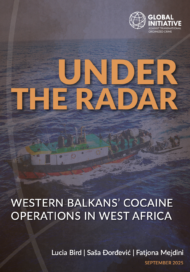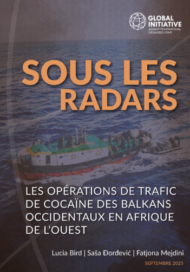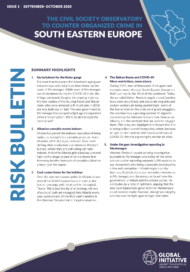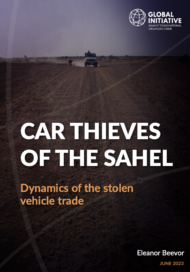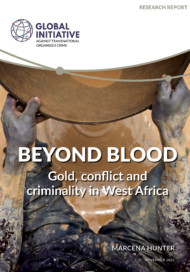Since 2019, some of the world’s most dangerous and sophisticated organized crime groups, rooted in the Western Balkans, but also major players in drug markets across Europe and Latin America, have expanded from their strongholds at either end of the cocaine supply chain to launch operations in West Africa. Until now, they have largely gone unnoticed.
According to this report, Western Balkans networks have moved multi-tonne consignments of cocaine from Brazil and other exporting areas in Latin America by sea to numerous West African coastal states.
Leveraging their well-established position in cocaine exporting countries in Latin America, criminal groups from the Western Balkans are using West Africa as a logistical, storage and redistribution hub for cocaine shipments en route to European consumer markets and destinations farther afield. “These groups have made inroads into West Africa as a result of rising demand for cocaine in Europe, increased enforcement along direct cocaine trafficking routes to Europe and strengthened partnerships with Latin American cartels, especially Brazil’s Primeiro Comando da Capital (PCC)”, explains Fatjona Mejdini, director of the GI-TOC’s Observatory of Illicit Economies in South Eastern Europe.
The report shows how Western Balkan groups now use multiple trafficking methods in West Africa, exploiting fully containerized routes, un-containerized shipments by smaller vessels, trans-shipments at sea and in-region containerization to conceal the cocaine’s origin. They collaborate with brokers in West African countries who organize logistics and liaise with local actors. ‘The use of brokers is a defining feature of these networks. They provide flexibility, local access and increasingly act as points of convergence between different groups,’ says Sasa Djordevic, one of the co-authors and senior analyst at the GI-TOC.
‘Operations by Western Balkan criminal networks have contributed to making West Africa a pivotal EU-bound cocaine transshipment node – and the region continues to grow in importance for the global cocaine trade,’ according to Lucia Bird, director of the GI-TOC’s Observatory of Illicit Economies in West Africa.
Some of the major Western Balkan groups in West Africa are the Montenegrin Kavač clan and its rival, the Škaljari clan. Albanian-speaking groups, which have a strong presence in Spain and Brazil, have also been operating in Senegal and The Gambia, sometimes collaborating with the Italian ‘Ndrangheta or the PCC. The groups’ structures are flexible and typically consist of small, trusted units supported by collaborators. Groups leverage local vulnerabilities to build relationships with corrupt elements of law enforcement, port operators and security services.
The report suggests that Western Balkan criminal groups are likely to operate more independently in West Africa as they come to rely less on alliances with the ‘Ndrangheta, the PCC and other Western Balkan groups, and instead invest directly in infrastructure and protection mechanisms. As in Latin America, their growing presence is likely to be accompanied by deeper corruption, potential violence and fragmentation into more autonomous cells. The region may also play a growing role as a convenient hub for accommodating Western Balkan fugitives from justice and facilitating money laundering.
To tackle this escalating threat, the report recommends a coordinated response based on three pillars:
- Strategic partnerships: Forging cross-continental law enforcement partnerships grounded in political economy insights and shared priorities, together with greater engagement with maritime shipping companies, which must play a greater role in responding to the global supply chain for cocaine trafficking. Public–private partnerships are essential in this effort.
- Enhanced intelligence systems: more granular, dynamic, multi-source data is needed about West Africa’s cocaine trade to underpin profiling and risk assessments, including at European maritime ports operating as gateways for cocaine shipped from the region.
- Smart targeting strategies: focusing on blocking the brokers, key nodes in criminal ecosystems, supported by parallel financial and criminal investigations.
Depuis 2019, certains des groupes criminels organisés les plus dangereux et sophistiqués au monde, implantés dans les Balkans occidentaux mais également acteurs majeurs des marchés de la drogue en Europe et en Amérique latine, ont étendu depuis leurs bastions leur emprise sur les deux extrémités de la chaîne d’approvisionnement de cocaïne pour lancer des opérations en Afrique de l’Ouest. A ce jour, ils sont restés largement inaperçus.
Selon ce rapport, des réseaux des Balkans occidentaux ont acheminé par voie maritime des cargaisons de cocaïne de plusieurs tonnes depuis le Brésil et d’autres zones d’exportation d’Amérique latine vers de nombreux États côtiers d’Afrique de l’Ouest.
S’appuyant sur leur position bien établie dans les pays exportateurs de cocaïne d’Amérique latine, des groupes criminels originaires des Balkans occidentaux utilisent l’Afrique de l’Ouest comme plateforme logistique, de stockage et de redistribution pour des convois de cocaïne à destination des marchés européens de consommation et d’autres destinations plus lointaines. « Ces groupes se sont tournés vers l’Afrique de l’Ouest en raison de la hausse de la demande de cocaïne en Europe, du renforcement des contrôles le long des routes directes de trafic vers l’Europe et du resserrement de leurs partenariats avec les cartels latino-américains, en particulier le Primeiro Comando da Capital (PCC) au Brésil », explique Fatjona Mejdini, directrice de l’Observatoire des Economies Illicites en Europe du Sud-Est de GI-TOC.
Le rapport montre comment les groupes des Balkans occidentaux font désormais recours à plusieurs méthodes de trafic en Afrique de l’Ouest, en exploitant des routes entièrement conteneurisées, des expéditions non conteneurisées par de plus petits navires, des transbordements en mer et la conteneurisation au sein même de la région pour dissimuler l’origine de la cocaïne. Ils collaborent avec des courtiers/intermédiaires dans les pays d’Afrique de l’Ouest, qui organisent la logistique et assurent la liaison avec les acteurs locaux. « Le recours à des intermédiaires est une caractéristique déterminante de ces réseaux. Ils offrent de la flexibilité, un accès local et font de plus en plus office de points de convergence entre différents groupes », indique Sasa Djordevic, co-auteur et analyste principal à la GI-TOC.
« Les opérations des réseaux criminels des Balkans occidentaux ont contribué à faire de l’Afrique de l’Ouest un pivot central de transbordement de cocaïne à destination de l’UE — et la région ne cesse de gagner en importance dans le commerce mondial de la cocaïne », selon Lucia Bird, directrice de l’Observatoire des Economies Illicites en Afrique de l’Ouest de GI-TOC.
Parmi les principaux groupes des Balkans occidentaux présents en Afrique de l’Ouest figurent le clan monténégrin Kavač et son rival, le clan Škaljari. Des groupes albanophones, fortement implantés en Espagne et au Brésil, opèrent également au Sénégal et en Gambie, collaborant parfois avec la ’Ndrangheta italienne ou le PCC. Leurs structures sont flexibles et généralement composées de petites unités de confiance soutenues par des complices. Les groupes exploitent les vulnérabilités locales pour nouer des relations avec des éléments corrompus des forces de l’ordre, des opérateurs portuaires et des services de sécurité.
Le rapport suggère que les groupes criminels des Balkans occidentaux sont susceptibles d’opérer plus indépendamment en Afrique de l’Ouest à mesure qu’ils dépendront moins d’alliances avec la ’Ndrangheta, le PCC et d’autres groupes balkaniques, et qu’ils investiront directement dans des infrastructures et des mécanismes de protection. Comme en Amérique latine, leur présence croissante risque de s’accompagner d’une corruption plus profonde, de potentielles violences et d’une fragmentation en cellules plus autonomes. La région pourrait également jouer un rôle croissant de hub commode pour accueillir des fugitifs des Balkans occidentaux et faciliter le blanchiment d’argent.
Pour faire face à cette menace grandissante, le rapport recommande une réponse coordonnée articulée autour de trois piliers :
- Partenariats stratégiques : Forger des partenariats intercontinentaux entre forces de l’ordre, fondés sur des analyses d’économie politique et des priorités partagées, ainsi qu’un engagement accru des compagnies maritimes, qui doivent jouer un rôle plus important en réponse à la chaîne logistique mondiale du trafic de cocaïne. Les partenariats public-privé sont essentiels à cet égard.
- Systèmes de renseignement améliorés : des données plus granulaires, dynamiques et provenant de sources multiples sont nécessaires sur le commerce de la cocaïne en Afrique de l’Ouest afin d’étayer le profilage et l’évaluation des risques, y compris dans les ports maritimes européens qui servent de points d’entrée pour la cocaïne expédiée depuis cette région.
- Stratégies de ciblage intelligentes : se concentrer sur le blocage des intermédiaires (brokers), acteurs clés des écosystèmes criminels, en faisant usage des enquêtes financières et pénales parallèles.
Depuis 2019, certaines des organisations criminelles les plus dangereuses et sophistiquées au monde, enracinées dans les Balkans occidentaux mais également actives sur les marchés de la drogue en Europe et en Amérique latine, se sont étendues de leurs bastions situés aux deux extrémités de la chaîne d’approvisionnement en cocaïne pour lancer des opérations en Afrique de l’Ouest. Jusqu’à présent, elles étaient largement passées inaperçues.
Selon ce rapport, les réseaux des Balkans occidentaux ont acheminé par voie maritime des cargaisons de plusieurs tonnes de cocaïne depuis le Brésil et d’autres zones d’exportation en Amérique latine vers de nombreux États côtiers d’Afrique de l’Ouest.
S’appuyant sur leur position bien établie dans les pays exportateurs de cocaïne d’Amérique latine, les groupes criminels des Balkans occidentaux utilisent l’Afrique de l’Ouest comme un centre logistique, de stockage et de redistribution pour les envois de cocaïne à destination des marchés de consommation européens et d’autres régions du monde. « Ces groupes ont investi l’Afrique de l’Ouest en raison de la hausse de la demande de cocaïne en Europe, du renforcement des contrôles le long des routes directes de trafic vers l’Europe et de partenariats consolidés avec les cartels latino-américains, notamment le Primeiro Comando da Capital (PCC) du Brésil », explique Fatjona Mejdini, directrice de l’Observatoire des économies illicites en Europe du Sud-Est du GI-TOC.
Le rapport montre comment les groupes des Balkans occidentaux utilisent désormais plusieurs méthodes de trafic en Afrique de l’Ouest, exploitant des routes entièrement conteneurisées, des expéditions non conteneurisées par de plus petits navires, des transbordements en mer et la conteneurisation régionale pour dissimuler l’origine de la cocaïne. Ils collaborent avec des intermédiaires dans les pays d’Afrique de l’Ouest qui organisent la logistique et coordonnent les acteurs locaux. « L’utilisation de courtiers est une caractéristique déterminante de ces réseaux. Ils offrent flexibilité, accès local et servent de plus en plus de points de convergence entre différents groupes », précise Sasa Djordevic, co-auteur et analyste principal au GI-TOC.
« Les opérations des réseaux criminels des Balkans occidentaux ont contribué à faire de l’Afrique de l’Ouest un nœud central de transbordement de cocaïne à destination de l’Union européenne – et la région continue de gagner en importance pour le commerce mondial de la cocaïne », souligne Lucia Bird, directrice de l’Observatoire des économies illicites en Afrique de l’Ouest du GI-TOC.
Parmi les principaux groupes des Balkans occidentaux actifs en Afrique de l’Ouest figurent le clan monténégrin Kavač et son rival, le clan Škaljari. Les groupes albanophones, fortement présents en Espagne et au Brésil, opèrent également au Sénégal et en Gambie, collaborant parfois avec la ‘Ndrangheta italienne ou le PCC. Les structures de ces groupes sont souples et composées de petites unités de confiance appuyées par des collaborateurs. Ils exploitent les vulnérabilités locales pour tisser des liens avec des éléments corrompus des forces de l’ordre, des opérateurs portuaires et des services de sécurité.
Le rapport indique que les groupes criminels des Balkans occidentaux devraient opérer de manière plus autonome en Afrique de l’Ouest, en s’appuyant moins sur leurs alliances avec la ‘Ndrangheta, le PCC et d’autres groupes balkaniques, et en investissant davantage directement dans les infrastructures et les mécanismes de protection. Comme en Amérique latine, leur présence croissante risque de s’accompagner d’une corruption accrue, de violences potentielles et d’une fragmentation en cellules plus autonomes. La région pourrait également jouer un rôle grandissant comme refuge pour les fugitifs des Balkans occidentaux et comme plateforme de blanchiment d’argent.
Pour faire face à cette menace croissante, le rapport recommande une réponse coordonnée reposant sur trois piliers :
- Partenariats stratégiques : établir des partenariats intercontinentaux entre les services de sécurité, fondés sur une compréhension des dynamiques politico-économiques et des priorités communes, ainsi qu’un engagement renforcé avec les compagnies maritimes, qui doivent jouer un rôle accru dans la lutte contre le trafic mondial de cocaïne. Les partenariats public-privé sont essentiels dans cette approche.
- Systèmes de renseignement renforcés : il est nécessaire de disposer de données plus détaillées, dynamiques et multi-sources sur le commerce de la cocaïne en Afrique de l’Ouest pour appuyer le profilage et les évaluations des risques, y compris dans les ports maritimes européens servant de points d’entrée pour la cocaïne expédiée depuis la région.
- Stratégies de ciblage intelligent : concentrer les efforts sur le démantèlement des courtiers, éléments clés des écosystèmes criminels, en s’appuyant sur des enquêtes financières et pénales menées en parallèle.
